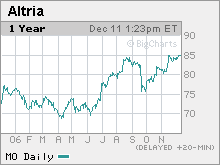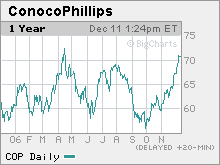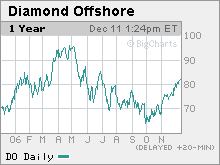Fortune -- Die 10 besten Aktien für 2007
American International Group (AIG)

Hear the letters A-I-G, and chances are you think of the company's cantankerous former chairman and CEO, Maurice "Hank" Greenberg. During his four-decade reign the hard-charging Greenberg built AIG into the world's largest insurer, with operations in more than 100 countries. Investors loved him for his ability to somehow magically deliver 15 percent earnings growth quarter after quarter, and they awarded AIG shares a premium price/earnings multiple in the stock market.
The praise was overdone, of course, as the company got swept up in a series of highly publicized accounting scandals and government investigations that eventually cost Greenberg his job. In March 2005, Greenberg and several top executives resigned, leaving others to mop up the mess.
Nearly two years later, however, it's clear that AIG was no Enron. Under CEO Martin Sullivan, a 30-year company veteran, AIG has survived restating five years' worth of earnings, has paid billions to settle fraud charges with government authorities, and is reporting impressive profit growth once again. Led by a strong showing in its property and casualty business, the company registered a 38 percent jump in net income in the first three quarters of 2006 before investment gains or losses, to $11.6 billion. As Don Yacktman, who recently purchased more than 100,000 shares for his Yacktman Funds, puts it, "A little bit of plastic surgery and - voilà! - the ugly duckling becomes a swan."
Expect more strong results in 2007. Hurricane Katrina, which damaged billions of dollars' worth of homes, commercial structures and energy facilities, should help AIG's P&C business, which accounts for 33 percent of profits, because it allowed the company to boost premiums and impose more stringent terms and conditions on commercial policies. Meanwhile, AIG's foreign life-insurance unit, which accounts for 28 percent of earnings, should continue its rapid expansion, particularly in the immense Asian market.
Wall Street analysts have constructed fancy models to try to figure out how much of a premium AIG shares should fetch in the post-Greenberg era, if any. But their numbers are at best educated guesses. What's clear is that the stock is cheap, trading for 12 times estimated 2007 earnings, close to its historical low. And growth prospects are attractive, with profits projected to increase 13 percent annually for the next few years.
Altria (MO)

We've been recommending Altria Group for the past several years, and the stock has consistently been one of our best performers. We're picking it again for 2007. With about $100 billion in sales, the company - love it or hate it - is the world's largest cigarette maker and, through its Kraft Foods subsidiary, one of the biggest food processors. In the U.S., Marlboro, the top-selling cigarette brand, continues to thrive by stealing share; it now controls 41 percent of the market. Overseas sales are growing rapidly. The company now accounts for 60 percent of cigarette sales in Mexico, nearly 40 percent in Western Europe and 25 percent in Japan.
The litigation picture continues to improve, making costs far more predictable. In August a federal judge overseeing the government's landmark tobacco lawsuit ruled that she didn't have the authority to order major financial remedies, including industry-funded smoking-cessation programs. In November the Supreme Court refused to revive a $10 billion award against Altria's Philip Morris USA related to the marketing of "light" cigarettes.
Finally, there's the likely spinoff of Kraft Foods, a move that investors have long believed would unlock further value for Altria shares. "That's the key reason we're holding it," says David Dreman of Dreman Value Management, which owns 17 million shares. "As long as the companies are together, you won't get the full value for Philip Morris." The precise timing of the sale is to be announced at the company's Jan. 31 board meeting. In the meantime, Altria is selling for 15 times projected 2007 earnings and offers a fat 4.1 percent dividend yield.
ConocoPhillips (COP)

With oil and natural-gas prices easing from their 2006 peaks, buying into a big energy company might seem dangerous. But barring an unforeseen collapse in commodity prices, ConocoPhillips should turn in a solid performance.
Formed by the 2002 merger of midsized oil firms Conoco and Phillips Petroleum, the Houston energy company is the third-largest U.S. oil operator, behind Exxon Mobil and Chevron. With total U.S. refining capacity of 2.2 million barrels a day, it's the nation's second-largest refiner after Valero. And thanks to its recent $35 billion purchase of Burlington Resources, ConocoPhillips is the country's largest natural-gas producer. This diverse business mix helps smooth earnings.
Unlike many oil industry executives, CEO Jim Mulva isn't sitting on the piles of cash he's built up over the past few years from high energy prices. Instead he's aggressively reshaping the company to spur growth. Mulva will spend $13 billion in 2007 to finance new drilling projects and upgrade investment-starved refineries. He also plans to reduce debt, repurchase stock and increase the dividend; the current yield is 2.1 percent.
What's perhaps most attractive about Conoco is the stock price. Shares sell for just seven times estimated 2007 earnings, a steep discount compared with Exxon Mobil and Chevron, which trade for 11 and nine times earnings, respectively. The gap stems largely from Mulva's willingness to embrace new projects and Conoco's relatively heavy (for an oil giant) debt load. But at 25 percent of capital, the debt is manageable, given Conoco's strong cash flows. And Mulva has proved a good steward of shareholder money. "The company does a great job getting the most out of its assets," says Morningstar analyst Justin Perucki.
Diamond Offshore (DO)

It's not often that you find stock investors and commodities traders betting on completely different economic outcomes. But that's exactly the disconnect that exists today with oil. Consider contract oil drillers like Diamond Offshore, Ensco, and Noble - vendors that hire out their drilling rigs to the likes of Chevron and Exxon Mobil for a daily fee. The rise in oil prices over the past few years has caused the day rates they charge for their rigs to skyrocket along with their share prices. Analysts expect Diamond's earnings to rise 178 percent in 2006, and since most of its rigs are already under contract at even higher rates for next year, analysts are expecting earnings to jump another 86 percent in 2007. "We're booking rigs out into '08, '09 and even 2012 at very high rates," says Diamond Offshore president Larry Dickerson, who notes that such contracts are rarely broken. "I'm not sure the stock market appreciates the strength of earnings that are going to come in '08 and '09."
Since May the stock market has essentially been betting that drillers' earnings would fall with the price of oil, now about $63 a barrel. How else to explain stocks with triple-digit earnings growth trading at single-digit P/E ratios? Yet whereas equity investors may think oil is headed lower, commodities traders - folks who presumably have a better feel for oil's fundamentals than the typical stock jockey - are wagering the other way. The price of December 2007 oil futures is now near $70 a barrel, well above the current spot price.
Bob Rodriguez, manager of the FPA Capital fund, considers drillers a rare pocket of value in an otherwise overpriced market. Rodriguez, whose total returns rank him tenth among all equity-fund managers over the past 15 years, now has 40 percent of his fund in cash and 14 percent in oil drillers - most of which are down 20 to 30 percent from their May 2006 highs. "It doesn't surprise me that you've seen this rapid swing from superbullish to superbearish [on oil stocks]," says Rodriguez. "Most investors are rank speculators."
Available drilling rigs, particularly deep-sea drilling rigs, are in such short supply right now that the rates for rigs not yet under contract for 2007 are going through the roof, says A.G. Edwards oil-services analyst Poe Fratt. That's a rich opportunity for Diamond, which has more rigs available than most of its rivals. And it's one reason Diamond is Fratt's favorite driller.
Another: The company paid out a $1.50-a-share special dividend (on top of the regular 50-cent dividend) last February, and Fratt thinks 2007's special dividend - Dickerson confirms that there'll be one - could be anywhere from $3 to $5 a share. Add it up, and you've got a stock with that 86 percent projected earnings growth trading at only nine times next year's estimated earnings and offering a possible dividend yield of 5 percent to 7 percent. In other words, a steal.
General Dynamics (GD)

The biggest untold story out of Washington these days is the tremendous growth in federal tax revenues, which increased 12 percent in the fiscal year ended in September and 15 percent in 2005. David E. Baker, a defense analyst with Stanford Washington Research, thinks that a fast withdrawal from Iraq is unlikely, and that military and homeland-security spending will grow at least as much under a Democratic Congress as they did under the Republicans. Baker, a retired Air Force brigadier general, says Democrats understand that any effort to slow the growth of defense spending now would just become campaign fodder for Republicans seeking to portray them as soft on terrorism. "That's a label they want to avoid at all costs," he says.
Here's another reason to play defense: "Solid economic growth and the surge in global commodity prices have provided the liquidity necessary for a number of countries to fund arms buildups," Merrill Lynch chief investment strategist Richard Bernstein wrote in a recent report. Over the past several months the Pentagon has announced plans to sell $450 million in Northrop Grumman communications equipment to Jordan, $2.9 billion in General Dynamics Abrams tanks to Saudi Arabia, and $144 million in Lockheed Martin-made Patriot missiles to Japan.
The quick and easy way to play defense stocks is with the PowerShares Aerospace & Defense Portfolio (PPA), an exchange-traded sector fund. Our favorite individual stock: General Dynamics, which trades at 16 times 2007 earnings. Analysts expect those earnings to come in 13 percent ahead of this year's, and previous estimates have tended to be low.
Baker says the case for General Dynamics is straightforward: Democrats' defense budgets are likely to tilt toward spending "that directly supports the troops" - as opposed to futuristic projects like missile defense. Nicholas Chabraja, General Dynamics' CEO, agrees, to an extent, though he believes the issue transcends politics. "When troops get deployed in significant numbers it's not very surprising that the balance shifts toward supplying the current forces," Chabraja told Fortune in a rare interview. And as the leading manufacturer of tanks and armored vehicles, General Dynamics excels at supplying current forces.
Another reason to favor General Dynamics is its fast-growing corporate-jet business, Gulfstream, which is in itself a backdoor homeland-security play. With more and more corporations seeking to shield their executives from the hassles of flying commercial, Gulfstream now boasts an order backlog of $6.5 billion, up from $5.2 billion a year ago.
Quelle: CNN.com